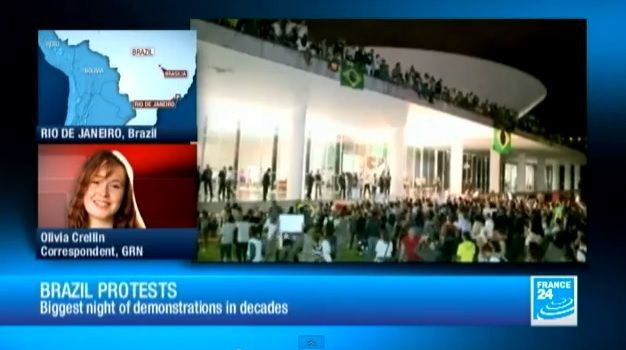
Over 200,000 people have marched through the streets of Brazil's major cities in protest of the rising cost of hosting the 2014 World Cup and the rising cost of public transportation. The protests have been going on for two weeks but the largest show of public outrage came Monday night when angry citizens took control of the streets of Brazil's cities.
RELATED: Brazil On Alert Following Ecuadorian Oil Spill
Protesters in Sao Paulo, Rio de Janeiro, Belo Horizonte and Brasilia blocked roadways, stopped traffic and even climbed to the roof of the Congress building in Brasilia and stormed it. Over the past two weeks anti-government protests in Brazil have been raging against the country's week economy and the spike in criminal activity, Reuters reports.
Monday night's protest is the largest in Brazil's history. The 1985 demonstration ending the country's dictatorship was Brazil's largest anti-government protest until now. The New York Times is reporting the demonstrations in Brazil grew more intense after the police tried to crack down and cease the protests, only to have the opposite effect.
RELATED: Happy Prostitute Ad Campaign Dropped By Brazil Health Ministry Following Criticism [VIDEO]
Like the revolution in Egypt in 2011 the Brazilian protests were organized using social media sites. People were having enough of the government raising the prices of public transportation while most of the public is suffering through severe poverty.
Unlike the protests on Thursday, Monday night's demonstrations were largely peaceful. On Thursday however police tried once again to crack down on protesters firing rubber bullets into crowds injuring 100 people. Among those injured by police were 15 journalists.
The Associated Press says the 65,000 people who gathered in Sao Paulo the "economic hub" in Brazil turned the once tension and anger filled atmosphere into one of carnival like fun with drumming and singing.
RELATED: 'Mr. Balls': Brazilian Cancer Mascot Is A Pair Of Testicles
The people were also rallying against the cost of hosting the 2014 World Cup and the 2016 Summer Olympics. The people of Brazil feel the money would be better spent on economic, heath and poverty issues, AP reports.
Maria Claudia Cardoso told the Associated Press that her community is crying out for help and hoping the government will listen when they say, "We're not satisfied."
© 2025 Latin Times. All rights reserved. Do not reproduce without permission.




